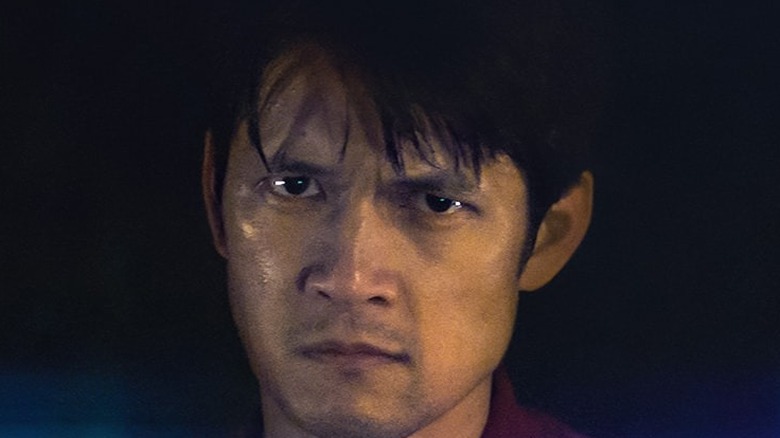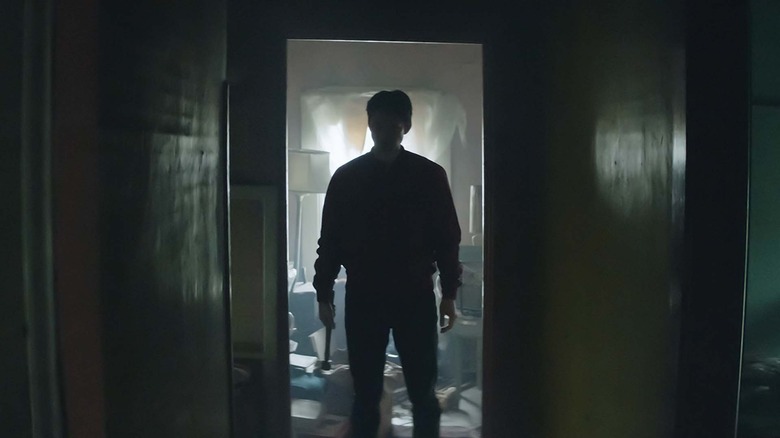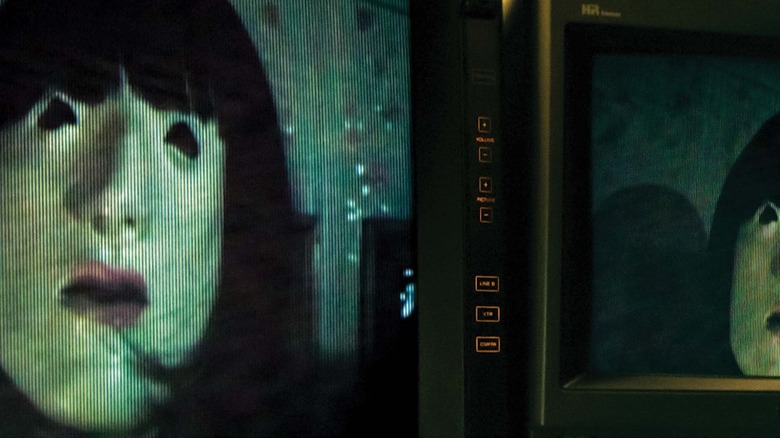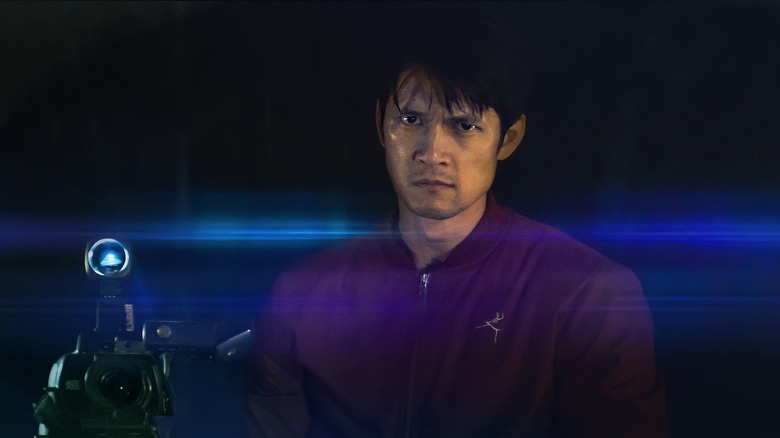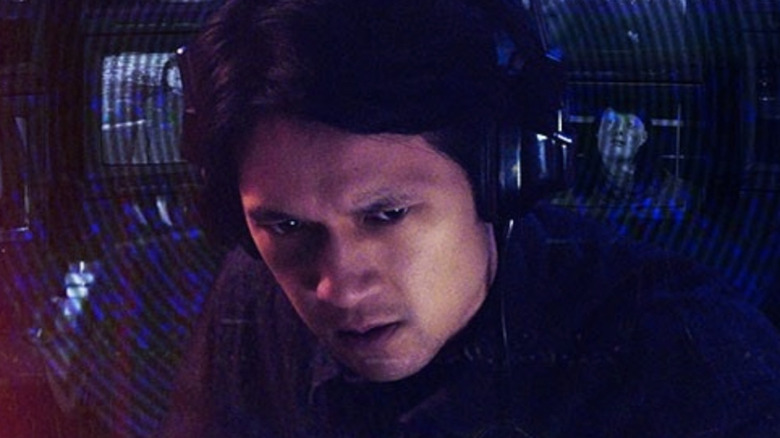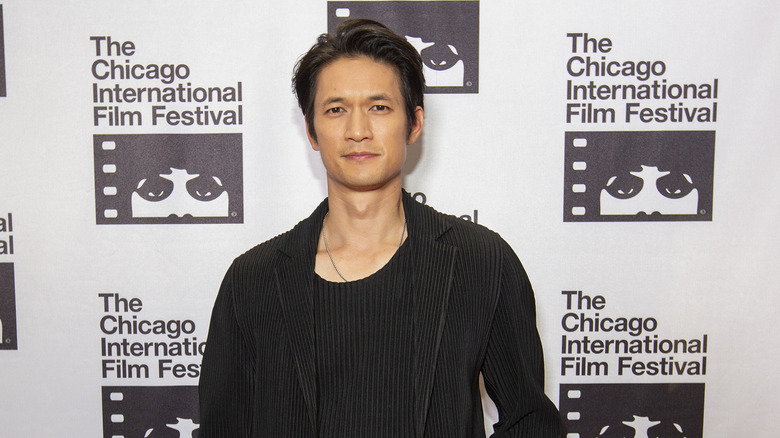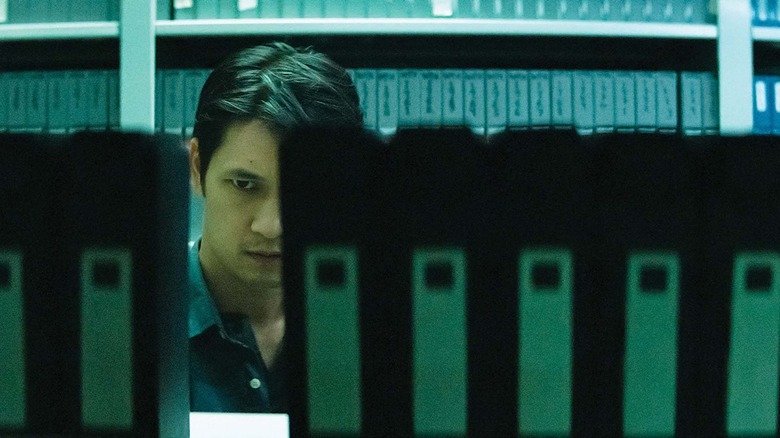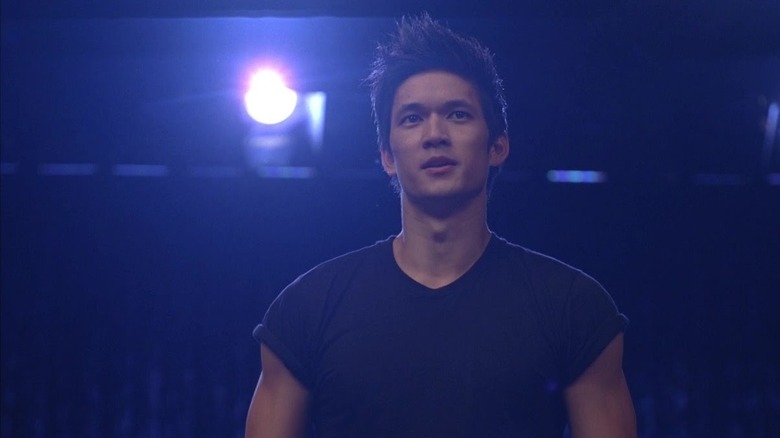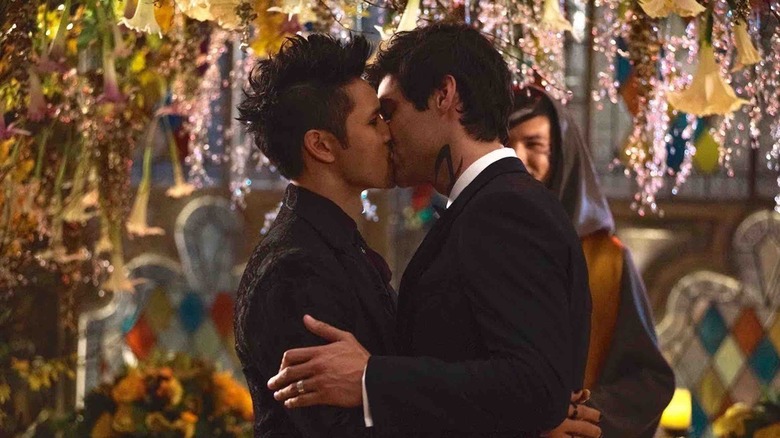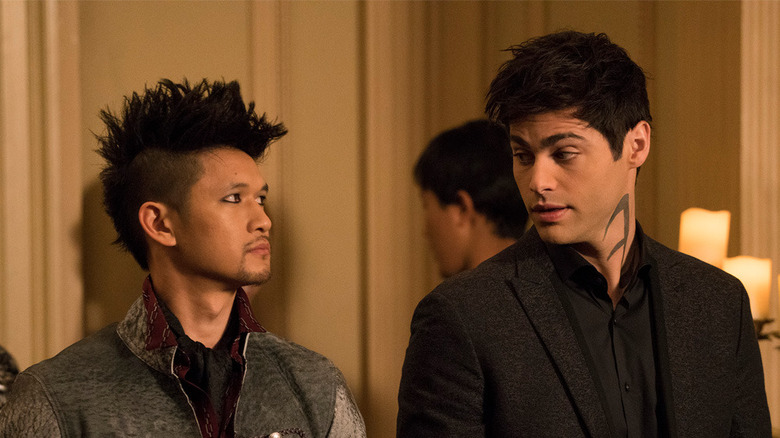Harry Shum Jr. Dishes On Broadcast Signal Intrusion's Deepest Mysteries - Exclusive Interview
Ever since Harry Shum Jr.'s 90-episode arc on "Glee," the actor has taken on roles in musicals, blockbuster dramas, fantasy, thriller, and animation — to name a few. Now, Shum Jr. is lending his talents to a film that tackles history, mystery, thriller, and horror.
Dark Sky Films' "Broadcast Signal Intrusion" pulls out all the genre stops in an eerie and titillating mystery that confounds the mind in the best way. Part of a story that takes a page from the broadcast signal intrusions Chicago experienced in the '80s, Shum Jr. plays James, a man whose grief over his wife's disappearance sets him out on a journey to discover whether these intrusions played a part in her vanishment.
Before he headed back in time to the late '90s to play James, Shum Jr. starred in films such as "Step Up 2: The Streets," "Mom's Night Out," "Crazy Rich Asians," and "All My Life." He's also a TV staple, having played arcs on shows including "Caper," "Single by 30," "Tell Me a Story," and of course, his starring role as Magnus Bane on "Shadowhunters."
During an exclusive interview with Looper, Harry Shum Jr. dished on "Broadcast Signal Intrusion," his take on the mystery elements, and why grief is such a critical topic to cover in film. He also went into what it was like filming the end of "Shadowhunters," revealed his favorite behind-the-scenes moments with Matthew Daddario, opened up about his "Glee" ending, and discussed his role on "Crazy Rich Asians."
Wading through the waters of mystery
This film is unlike anything you've done before, a blend of horror and thriller that we haven't seen a whole lot of lately. What drew you to this role, and what do you think sets it apart from other genre movies?
Yeah, I think, specifically in this genre, I think deep diving into this little bit of a psychological thriller and unsettling images — while also having this mystery that it's inspired by these real broadcast signal intrusions that happened in the '80s and are still unsolved until today.
I thought that this was such a brilliant script written by Phil Drinkwater and Tim Woodall, and Jacob Gentry's vision behind going a little step further beyond just intrusions and going down this rabbit hole. And really getting a character study on what happens when a person goes a little too far and connects a few too many of the dots that might not have been meant to connect.
Method acting through the terror
Speaking of those flashing images and the videos and the eerie masks, they're unsettling, to say the least. Did that creepiness help you get into character, or was it a hindrance that you had to work through?
Yeah, I think it helped me ... Everything was practical. I got to see everything in real time. There was no green screen. There was no look at the TV that didn't have anything on it and react to it. I was very fortunate to have that play into the performance.
But for me, getting into it was really just about getting this character that is very mysterious in a lot of ways. And we're just trying to pull out as much before we get into the action, which I think we don't know other than he is very lonely. For a living, he watches the past, looks at the past, and tries to transfer them over.
What drew me to him was really having this exploration of not knowing, and what is the unknown that's going to help, and what actions are you willing to take to know more about this mystery that you might have this weird personal connection to. And I found it to be really, in a weird way, therapeutic as well in the sense of getting these deep conversations with this character, but also with Jacob on how far someone can take things when they don't listen to the outside world.
An open-ended mystery
I would say that the horror and mystery elements of the film are secondary to the real main character: grief. How did you view James' journey coming to terms with his loss? And do you think a lot of these creepy elements are in his head, or is something more sinister going on?
Yeah, I think that's a good question. To me, what's special about this film is it says a lot more about whoever's watching it than the film in particular. And this artist participation is what really excites me about this film. Because even though it's been playing in so many festivals, people's theories that they come up with just blow my mind because I might not even be thinking on that level, and they're coming up with these really interesting theories that go beyond my comprehension.
And so I think to answer that question, I think that's a neat part about this whole journey that we've put up these questions that might have some answers and might not. And I had a conversation with Jacob pretty much every single day, and he a lot of times didn't have the answers. And I think there was something interesting, just even in life how we look at things. And we like to say we know when we actually really don't.
And we can talk about how gravity works, and yeah, obviously, it's very scientific, but most people won't be able to explain it. They just trust it. And they move on with life. And I wonder how many things we do that with that might not actually be the truth — it might not actually be real.
Grief as a main character
Having just done "All My Life," this is your second recent film that deals heavily with loss and grief. What do you enjoy about playing these kinds of characters, and why do you think these stories are so important to tell, especially now?
Yeah. Look, I mean, just as much as we need comedy, we need satire. We need action to feel heroic, and we need all these. And I think we need to explore these deeper things that I think a lot of people are afraid to face. And I think what better way to do it than in an entertaining fashion, where this is still beyond these themes that we're tackling that might be a little more serious?
I think there's also this entertaining aspect of, especially in this genre, whether you're talking about horror or psychological thriller and mystery, these things that it touches on, I think is just a fun journey to go on. And I think what we don't do enough as a community of audience members is to go back and just actually have deeper conversations about what we think. Because our whole existence got us to this place so we're going to have a different perspective on what we think James might have done or shouldn't have done or is doing. And to me, that's the fun part. It's very interactive, and I hope that's the big takeaway, that people just have a lot of conversations after watching the film.
Crafting your own ending
I can't wait to talk to people about it and get their take. The movie is left pretty open-ended at the end. Do you think it should stand alone as more of a think piece, or would you like to see the mystery unfold a little bit further in a sequel?
Yeah. I mean, I never thought of it as a sequel, but it keeps coming up. People are wanting to know more, and I think that's just, that's wonderful. Without giving anything away, when you see certain portions or certain scenes, you're going to be like, "Oh, that's a whole universe in itself." And we're all about universe building.
But I also don't mind it as a think piece where people can just take ownership of what they believe from what they got out of this film because I think Jacob also put a lot of interesting Easter eggs that haven't quite been figured out yet. Although there are some very, very smart people out there, and I'm sure you have some theories as well. I can see it in your face. You're like, "I know a couple of things that I believe are accurately true."
[Laughs] You're right.
The meat behind the mystery
Did you do any research on the Chicago broadcast signal intrusions that the film is loosely inspired by, or did you want to approach it without any outside influence?
I mean, I think how can you not, with Chicago being the place that these intrusions, the notorious intrusions, happened in 1987, and they still haven't been solved to this day?
I did an interview at WGN, where the first intrusion happened for the Max Headroom incident. And one of the anchors is still there, and seeing his reaction on tape over and over again was, I think, the most unsettling part. Because the intrusion itself was unsettling, but just the reaction like, "What just happened?" And you're trying to just get through to make everyone else feel comfortable when you are scared out of your mind. But also to have that live on and having your name repeated. FCC, FBI, everyone got involved during that time, so it was a huge deal that people are still to this day throwing up different theories that they figured it out or they've solved the mystery, and they really haven't.
I think that research was really important. Some people wanted to punch the TV screen. [Laughs] Kids thought it was funny. And it depends on how deep you want to look at them, and that's going to inform how serious it is.
Mike Chang dances on
Switching gears a bit, you were on 90 episodes of "Glee," which is an amazing feat. How do you feel about Mike's ending on the show, and is there anything regarding his character that you wish you got to delve into a little bit more?
When I look back now, I don't want anything to change. I think it all, whether ... I think, again, same thing with this, fans will feel a certain way. They wanted more, or they didn't really care, or they wanted a certain happy ending. And I get it — we all want that.
But I think at that time, the structure of the show was very ... Especially doing that many episodes with that many characters, I think that was the best-case scenario for Mike Chang. And I know he's thriving right now, wherever he is in some sort of alternate universe [laughs] that might exist. And I just hope that he's still dancing out there.
What were some of the most challenging and rewarding moments on that set?
I have a really bad memory, but I know what I ... The thing that I remember most is the fact that we had to do these numbers over and over again. Sometimes to the umpteenth of 40 times doing the same dance and lip-syncing.
But I think there's something really beautiful about being able to do that with the energy of the surrounding cast and crew that is tapping their foot. And even tapping their foot to the point where there might be blisters. [Laughs] But there's a sense of joy that music and dance brings people together, no matter what you're singing.
Saying goodbye to Magnus Bane
So your role in "Crazy Rich Asians" teases a much larger arc. What was that experience like, and are you willing to return for the sequel if given a chance?
Yeah. Look, I mean, I went there for two weeks and just had an incredible time with some incredible people. And that is one of the projects where everyone is just so entertaining, so interesting, and such great people that, yeah, I would love to do it again in a larger capacity. But just looking at the impact and especially the questions that come from it and how people are really excited, I can't help but feel that energy as well. I hope that comes to life very soon.
The last day of filming "Shadowhunters" was rough on a lot of the cast. What was that day like for you, and how did you feel saying goodbye to Magnus?
Yeah, I mean, it was hard. These characters and the effect that it had on a lot of people, even to this day it honestly just really warms my heart. You get to be part of projects, and you just hope that people are entertained and people like it. People can turn off whatever's happening in their life.
And not to put too much emphasis, but I know from firsthand talking to a lot of fans that this was a very meaningful show to them. And these characters were very, very meaningful and in a lot of ways defining in the sense of what they feel they could be in the sense of being themselves.
From Shadowhunters to Shadowshenanigans
And I thought that was just such a beautiful project and show to be a part of that transcends work as an actor. I just love that the fans are taking so much ownership over these characters because, at the end of the day, it is them. And I've learned over time that I'm able to portray whatever I can onscreen and do the best I can, but then at the end of the day, when it comes out, it's for the people to take ownership over.
And the last days were weird because we had to actually make it bittersweet for us because we knew the end was near. But also there were so many great memories and meeting such great people. And Matt [Daddario], Kat [McNamara], and Alberto [Rosende] and Dom [Sherwood] and Isaiah [Mustafa], and just the rest of the cast I still talk to, and they're just such special people. So I'm glad we got to do it.
Can you think of any fun behind-the-scenes stories between you and Matthew Daddario or the rest of the cast during your time filming?
I think a lot of it landed on the bloopers reel, which I actually watched recently because I never even watched them. I didn't even know they existed. There are at least two of them, but I only watched one of them, and it's so much just ... It was just fun just figuring out how to make this relationship just feel like a real relationship and real fun.
And Matt off-set is ... we have these massive debates of just the most ... I don't know, from wheat pasta to egg pasta, just dumb things where we get into heated arguments about it. And I think that always makes the scenes better in a weird way. Because there's just this, after we finish the scene, I'm going to go back to saying, "Wheat pasta's better than pasta you like — gluten-free." Anyway, yeah, those are the fun behind the scenes moments that I always remember.
Dark Sky Films' "Broadcast Signal Intrusion" is in theaters and on digital now.
